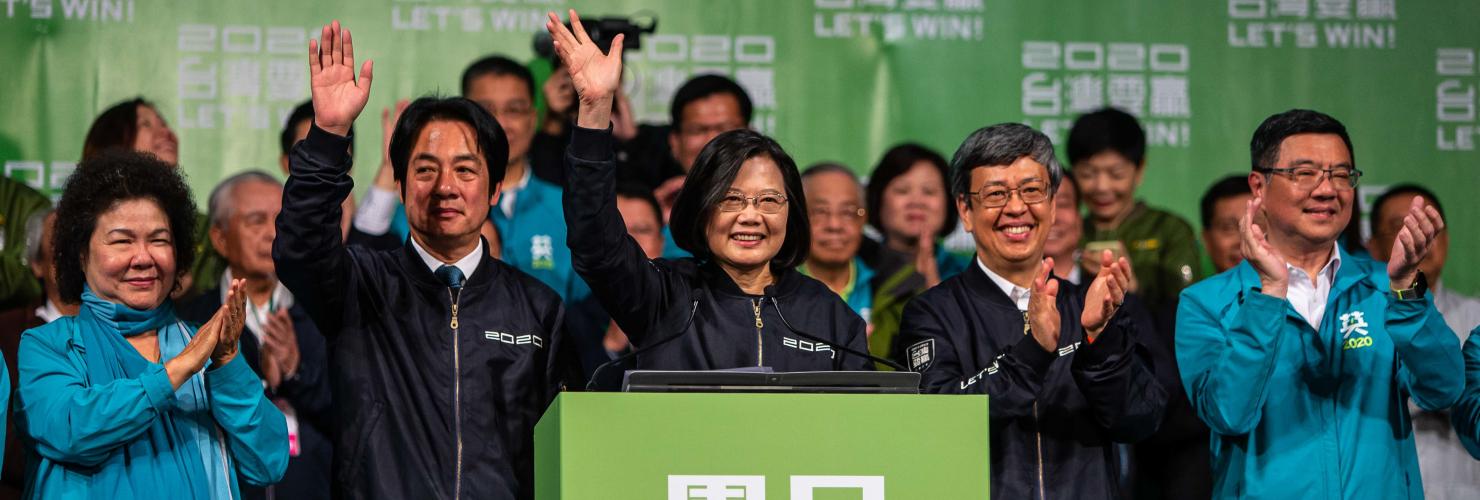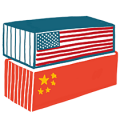

Praised by the West, rejected by China: Tsai Ing-wen re-elected in Taiwan
China Update 1/2020
METRIX
The Chinese market continues to play a key role for German luxury carmakers in spite of recent declines. BMW delivered 723,680 vehicles to China in 2019, an increase of 13.1 percent on the previous year and its best-ever performance since entering the country in 1994.
Topic of the week
Praised by the West, rejected by China: Tsai Ing-wen re-elected in Taiwan
The re-election of Taiwanese president Tsai Ing-wen on Saturday has been seen by most in the West as a vote for democracy and liberal values, and a clear rejection of mainland China’s model of “one country, two systems.” Tsai was reelected for another four years in a landslide victory, gaining over eight million votes – a record number. Her party also won a majority in the Legislative Yuan, Taiwan’s parliament.
This is despite – or perhaps because of - pressure from China. Since Tsai was first elected four years ago, Beijing has applied a number of tactics to achieve its aim of unifying Taiwan with the mainland, including refusing to speak to the Taiwanese government directly, isolating Taiwan internationally, sending intimidating statements, and putting pressure on Taiwanese businesses. In a speech just a year ago, Chinese President Xi Jinping made a veiled threat of military action. At the same time, Beijing has attempted to strike a more conciliatory note, offering Taiwanese companies and citizens various benefits.
The election result means that neither coercion nor the softer approach have worked. The Taiwanese electorate refused to be intimidated and, against the backdrop of the protests in Hong Kong, did not deem credible Beijing’s attempts to appear conciliatory. China’s predictable reaction was to claim, falsely, that Tsai’s victory was due to “dirty tactics such as cheating, repression and intimidation to get votes.” An op-ed by Xinhua also referred to “Western (external) political forces,” in particular the United States, meddling in the elections in an attempt to prevent rapprochement between Taiwan and mainland China.
The election result is, however, unlikely to lead to any major change in China’s policy towards Taiwan. The goal of reclaiming Taiwan for the mainland is based on a mix of patriotic legacy and geopolitical considerations. But with more pressing issues to tackle, China is unlikely to go as far as using military force in the near future. It is also unlikely that there will be any major change from the new Taiwanese government. Tsai is a defender of the status quo and de facto independence. Despite her new mandate and some domestic pressure, she is unlikely to go further and seek formal independence. And while the relationship with the PRC was the main topic during the election campaign, Tsai now also has to deliver on issues like economic and social policy. Nevertheless, in a press conference after the election results, she announced that she will actively promote Taiwan’s responsibility and contributions in international organizations.
“For the West, the election makes clear that this is a conflict that isn’t going away. Every government in Europe has to think about what they are willing to do to support Taiwan. Tensions are going to rise. They must ask themselves how they will handle increasing demands from the Chinese side to isolate Taiwan in international institutions.” MERICS expert Mareike Ohlberg.
China and the world
US-Iran tensions betray China’s foreign-policy priority: trade
The Chinese government condemned the targeted killing of Iranian Major General Qasem Soleimani as an “abuse of military force” by the United States, but noticeably held back from supporting Tehran in more overt ways.
After the US drone strike on January 3, Beijing reached out to Russia and France, fellow permanent members of the UN security Council, to emphasize the trio’s responsibility to act constructively to maintain peace, and state media suggested China should attempt to mediate given its economic interests.
But the Chinese leadership’s ensuing inaction was a sign of its being torn between supporting Iran – which it wants to keep onside as a source of oil and as a willing partner in limiting its nuclear program – and placating the US, whose goodwill it needs to end their trade dispute. Despite Beijing’s rhetoric, the US-Iran crisis was a reminder of China’s geopolitical limitations.
News in brief
- Human rights – NGO accuses China of being growing threat
- Myanmar relations – Xi Jinping visits to reinforce bilateral ties
- African tour – Foreign Minister Wang Yi concludes annual trip
- Eastern European ties – 17+1 format upgraded with Xi as host
Politics, society and media
Legal reform improves formal protection of right to freedom from arbitrary detention
The Chinese government has taken steps to bring parts of Chinese law closer into line with citizens’ constitutionally guaranteed right to freedom from arbitrary detention. These formal improvements stand in stark contrast to Beijing’s practice in Xinjiang, where Uyghurs and other minorities have been deprived of their liberty under compulsory re-education measures.
In reaction to internal and external criticism, the Standing Committee of the National People’s Congress (NPC) late December agreed two significant legal changes that strengthen the protection of the right to freedom from arbitrary detention in China. The abolition of the “custody and education” system and the passing of the Community Corrections Law – both measures came into effect at the start of the year – were designed to decrease reliance on imprisonment and detention.
The UN has long advocated for drastically reducing the use of these punishments given high rates of recidivism and problems with social re-integration – and Chinese legal experts also lobbied for changes. The People’s Daily, the Chinese Communist Party’s mouthpiece, hailed the abolition of police power to impose long-term detention as a “step forward for procedural justice”.
News in brief
- Suspected spying – German investigated for possible espionage for China
- Foreign textbooks – Ministry of Education bans use in schools
- Rules on religion – Tougher regulation comes into force
- Entry denied – Human Rights Watch boss can’t visit Hong Kong
- Wuhan coronavirus – New disease infects 41 in China, one in Thailand and one in Japan
Economy, finance and technology
First step to US-China trade deal fails to bridge divisions
The US and China this week signed a “phase one” of their long-awaited trade deal, but the omission of key structural issues signaled how fraught the superpowers’ relationship remains. President Trump’s zeal to publicize big headline numbers – such as China’s commitment to increase US purchases by USD 200 bn of the 2017 value – did not distract from the fact that their dispute over China’s economic practices and technological advances is far from resolved.
If anything, the purchase agreement raises fresh concerns over its feasibility and compliance with WTO rules on import quotas. Only time will tell whether the listed enforcement mechanisms will prove effective in holding China to its commitments on strengthening intellectual property protection, further opening its financial sector and refraining from currency manipulation.
In the meantime, Washington had to shelve central demands revolving around China’s use of state subsidies and cybertheft until the unconfirmed “phase two” agreement. But Beijing has also made big concessions: It had to accept that most tariffs on Chinese goods will remain in place and the US can re-impose additional levies in the event of any backsliding.
Chinese state media are spinning the agreement as a win-win deal and emphasize that most commitments in the agreement have long been a part of China’s reform and opening-up agenda. Vice Premier Liu He made comments during a press conference that China’s other trading partners would also benefit from Beijing’s commitments on IP rights protection, technology transfer and financial market opening.
“This deal contributes to avoiding an immediate escalation between China and the US. But only its implementation over the coming months will tell whether it is feasible and sustainable.” Max J. Zenglein, Head of Program for Economic Research at MERICS.
News in brief
- German exporters – Mechanical engineering association demands fairer trade with China
- Electric vehicles – China won’t cut subsidies by much this year
- Computer-chip maker – US lobbied Netherlands to stop sale to China
Profile
From semi-retirement to full throttle: Luo Huining is Beijing’s new Hong Kong envoy
Luo Huining (骆惠宁) recently took a challenging detour on what looked like a comfortable path to retirement: After a successful career as provincial governor and party secretary of Qinghai province and party secretary of Shanxi province, the 65-year old had in December taken up the prestigious post of deputy director of the financial and economic affairs committee of the National People’s Congress.
But his career soon after took a different path. To the surprise of Chinese domestic politics watchers, Luo was sent to Hong Kong to serve as the new director of the central government’s liaison office. He replaced the seemingly unsuccessful Wang Zhimin as China’s top envoy in the crisis-ridden financial hub in January.
The decision to bring a political veteran out of what was in effect semi-retirement and entrust him with such a challenging post is highly unusual. It shows that the leadership in Beijing has high hopes for Luo in a city plagued by unrest for many months. Born in Zhejiang in 1954, he got a PhD in economy at Renmin University and embarked on his successful career in the agricultural province of Anhui.
Luo, a staunch supporter of state and party leader Xi Jinping, proved his skill on previous postings: In the province of Shanxi, for instance, he managed the trick of successfully fighting corruption in the deeply graft-ridden coal industry while at the same time maintaining solid economic growth. Luo has experience in dealing with complex local and regional situations – a quality that in the eyes of his bosses in Beijing means he is ideally suited for dealing with the ongoing crisis in Hong Kong.
Beijing has been struggling for months to develop a strategy to placate protestors who want more autonomy from and less interference by the Chinese leadership. November’s landslide victory of the pro-democracy camp in the local council elections caught China’s leaders totally off-guard. It took them days to come up with a coordinated reaction – the result of apparent miscommunication regarding the actual mood in Hong Kong, for which Luo’s predecessor had to take the blame.
Beijing’s new top envoy is expected to make good on this failure. The fact that he previously had nothing to do with Hong Kong is considered a strength, not a weakness. Luo has no Hong Kong connections or networks that might influence his perspective and will. And so, Beijing hopes that he will report neutrally and swiftly. By appointing an almost retired cadre, China’s leadership is also playing for time: As Hong Kongers know, Luo will not stay forever. It is unlikely that he will stir major emotions in the protest movement.

